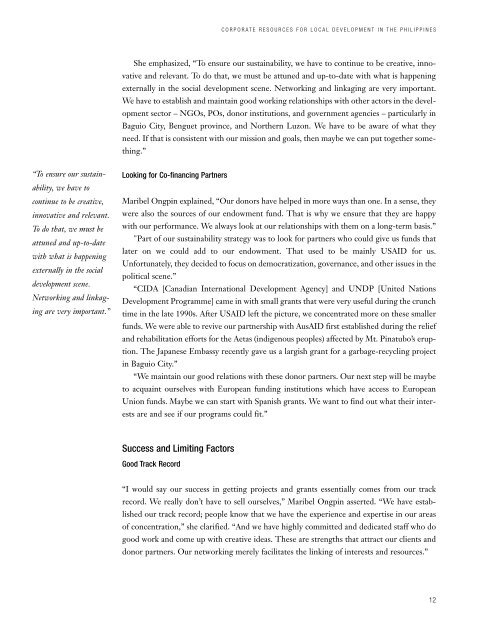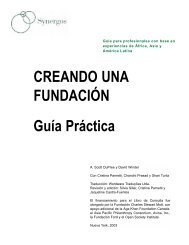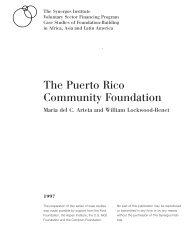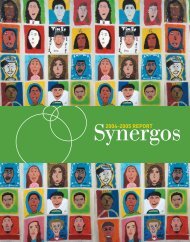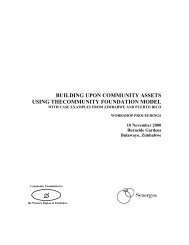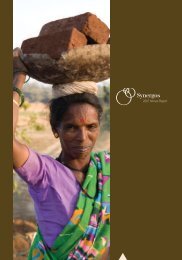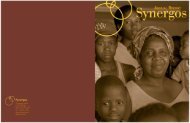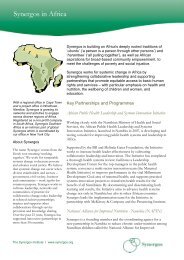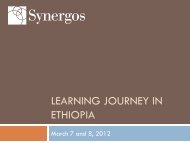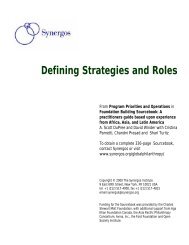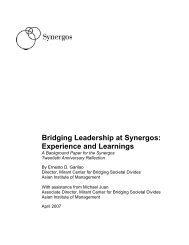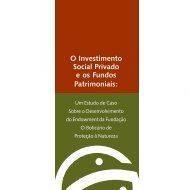Download full text of paper (PDF) - Synergos
Download full text of paper (PDF) - Synergos
Download full text of paper (PDF) - Synergos
Create successful ePaper yourself
Turn your PDF publications into a flip-book with our unique Google optimized e-Paper software.
CORPORATE RESOURCES FOR LOCAL DEVELOPMENT IN THE PHILIPPINES<br />
She emphasized, “To ensure our sustainability, we have to continue to be creative, innovative<br />
and relevant. To do that, we must be attuned and up-to-date with what is happening<br />
externally in the social development scene. Networking and linkaging are very important.<br />
We have to establish and maintain good working relationships with other actors in the development<br />
sector – NGOs, POs, donor institutions, and government agencies – particularly in<br />
Baguio City, Benguet province, and Northern Luzon. We have to be aware <strong>of</strong> what they<br />
need. If that is consistent with our mission and goals, then maybe we can put together something.”<br />
“To ensure our sustainability,<br />
we have to<br />
continue to be creative,<br />
innovative and relevant.<br />
To do that, we must be<br />
attuned and up-to-date<br />
with what is happening<br />
externally in the social<br />
development scene.<br />
Networking and linkaging<br />
are very important.”<br />
Looking for Co-financing Partners<br />
Maribel Ongpin explained, “Our donors have helped in more ways than one. In a sense, they<br />
were also the sources <strong>of</strong> our endowment fund. That is why we ensure that they are happy<br />
with our performance. We always look at our relationships with them on a long-term basis.”<br />
"Part <strong>of</strong> our sustainability strategy was to look for partners who could give us funds that<br />
later on we could add to our endowment. That used to be mainly USAID for us.<br />
Unfortunately, they decided to focus on democratization, governance, and other issues in the<br />
political scene.”<br />
“CIDA [Canadian International Development Agency] and UNDP [United Nations<br />
Development Programme] came in with small grants that were very useful during the crunch<br />
time in the late 1990s. After USAID left the picture, we concentrated more on these smaller<br />
funds. We were able to revive our partnership with AusAID first established during the relief<br />
and rehabilitation efforts for the Aetas (indigenous peoples) affected by Mt. Pinatubo’s eruption.<br />
The Japanese Embassy recently gave us a largish grant for a garbage-recycling project<br />
in Baguio City.”<br />
“We maintain our good relations with these donor partners. Our next step will be maybe<br />
to acquaint ourselves with European funding institutions which have access to European<br />
Union funds. Maybe we can start with Spanish grants. We want to find out what their interests<br />
are and see if our programs could fit.”<br />
Success and Limiting Factors<br />
Good Track Record<br />
“I would say our success in getting projects and grants essentially comes from our track<br />
record. We really don’t have to sell ourselves,” Maribel Ongpin asserted. “We have established<br />
our track record; people know that we have the experience and expertise in our areas<br />
<strong>of</strong> concentration,” she clarified. “And we have highly committed and dedicated staff who do<br />
good work and come up with creative ideas. These are strengths that attract our clients and<br />
donor partners. Our networking merely facilitates the linking <strong>of</strong> interests and resources.”<br />
12


